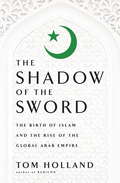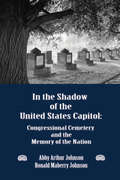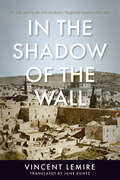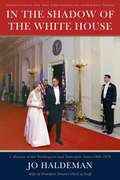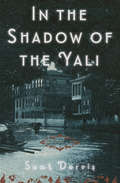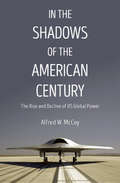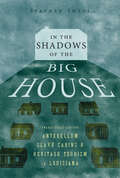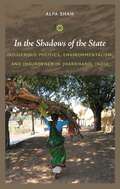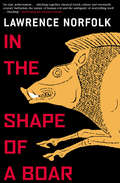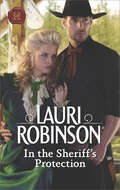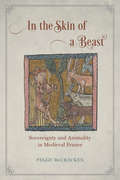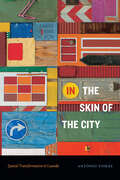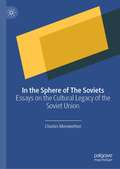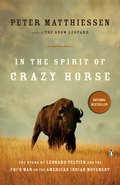- Table View
- List View
In the Shadow of the Sword
by Tom HollandThe acclaimed author of Rubicon and other superb works of popular history now produces a thrillingly panoramic (and incredibly timely) account of the rise of Islam. No less significant than the collapse of the Roman Republic or the Persian invasion of Greece, the evolution of the Arab empire is one of the supreme narratives of ancient history, a story dazzlingly rich in drama, character, and achievement. Just like the Romans, the Arabs came from nowhere to carve out a stupefyingly vast dominion--except that they achieved their conquests not over the course of centuries as the Romans did but in a matter of decades. Just like the Greeks during the Persian wars, they overcame seemingly insuperable odds to emerge triumphant against the greatest empire of the day--not by standing on the defensive, however, but by hurling themselves against all who lay in their path.
In the Shadow of the Sword
by Tom HollandThe acclaimed author of Rubicon and other superb works of popular history now produces a thrillingly panoramic (and incredibly timely) account of the rise of Islam. No less significant than the collapse of the Roman Republic or the Persian invasion of Greece, the evolution of the Arab empire is one of the supreme narratives of ancient history, a story dazzlingly rich in drama, character, and achievement. Just like the Romans, the Arabs came from nowhere to carve out a stupefyingly vast dominion--except that they achieved their conquests not over the course of centuries as the Romans did but in a matter of decades. Just like the Greeks during the Persian wars, they overcame seemingly insuperable odds to emerge triumphant against the greatest empire of the day--not by standing on the defensive, however, but by hurling themselves against all who lay in their path.
In the Shadow of the United States Capitol: Congressional Cemetery and the Memory of the Nation
by Abby Arthur Johnson Ronald M. JohnsonA fascinating study of America’s first national burial ground, with photos: “It’s stunning to realize what a who’s who exists in that space.” —Howard Gillette, Professor Emeritus, Rutgers University at CamdenThis study explores the multiple ways in which Congressional Cemetery has been positioned for some two hundred years in “the shadow” of the U.S. Capitol. The narrative proceeds chronologically, discussing the burial ground during three periods: the antebellum years; the years from the end of the Civil War to approximately 1970, when the site progressively deteriorated; and the period from the early 1970s to 2007, when both public and private organizations worked to preserve the physical site and the memory of what it has been and continues to represent. This monograph focuses on the dominant narrative associated with the site: its legacy as the first national burial ground in the nation. Given this emphasis, the text presents a political and cultural analysis of the cemetery, with particular focus on the participation of the U.S. Congress. “This book makes historians and many others aware of a fascinating and complicated history. Moreover, it not only details the long history of the cemetery, but it uses it to explore the nature of historic memorials generally in the creation of national memory.” —Steven Diner, Chancellor of Rutgers University at Newark“The history of Congressional Cemetery is intimately tied up in the changing demographics of its locale, and its corresponding decline as the neighborhood around Christ Church changed led to its emergence as a cause célèbre for historic preservationists.” —Donald Kennon, Chief Historian for the United States Capitol Historical Society and editor of The Capitol Dome“The Johnsons have done an excellent job of mining a wide range of sources and conveying the complex history of an institution that merits documentation.” —Howard Gillette, Professor Emeritus, Rutgers University at Camden
In the Shadow of the Wall: The Life and Death of Jerusalem's Maghrebi Quarter, 1187–1967
by Vincent LemireThe Maghrebi Quarter of Jerusalem long sat in the shadow of the Western Wall, the last vestige of the Second Temple. Three days after the June '67 War, Israeli forces razed the Quarter, its narrow alleys widened and homes removed, to create the Western Wall Plaza. With this book, Vincent Lemire offers the first history of the Maghrebi Quarter—spanning 800 years from its founding by Saladin in 1187 to house North African Muslim pilgrims through to its destruction. To bring this vanished district back to life, Lemire gathers its now-scattered documentation in the archives of Muslim pious foundations in Jerusalem and the Red Cross in Geneva, in Ottoman archives in Istanbul and Israeli state archives. He engages testimonies of former residents and looks to recent archaeological digs that have resurfaced household objects buried during the destruction. Today, the Western Wall Plaza extends over the former Maghrebi Quarter. It is one of the most identifiable places in the world—yet one of the most occluded in history. In the Shadow of the Wall offers a new point of entry to understand this consequential place.
In the Shadow of the White House: A Memoir of the Washington and Watergate Years 1968-1978
by Jo HaldemanFor her first forty years, Jo Haldeman's life followed a conventional path. While her husband, Bob, built his career in advertising, Jo comfortably settled into her role as mother of four, housewife, and community volunteer. In 1968, Jo's world changed dramatically. Richard Nixon was elected President of the United States, and Bob was offered the job of a lifetime--White House Chief of Staff. As Jo and Bob discussed the opportunities and challenges that this move would entail, little did she anticipate the course that her life, and her relationship with Bob, would take over the next ten years. In this insightful, poignant, and guileless memoir of those ten years, Jo shares her story as the wife of H. R. Haldeman, often referred to as the second most powerful person in the White House. She offers a window into the world of trips on Air Force One, weekends at Camp David, and events at the White House, as well as family vignettes and the growing stresses of her husband's demanding job. Then a bungled burglary at the Watergate erupted into a national scandal. The news began to feature the Haldeman name. Blaring headlines and vicious political cartoons accompanied new revelations of a cover-up. Multiple investigations and Senate hearings followed. Criminal proceedings loomed. Jo's compelling account takes the reader on her journey from the heady heights of Washington life through an excruciating public resignation and trial to her husband's conviction and imprisonment. In a true period piece, Jo illuminates the story of the "woman behind the man" and personalizes the Watergate experience. Enhanced by her personal photographs and the immediacy of her present tense delivery, In the Shadow of the White House is a fascinating work of nonfiction that reads like a novel. Jo Haldeman was married to H. R. "Bob" Haldeman, Richard Nixon's Chief of Staff, for forty-four years. She lives in Santa Barbara, California, and has four children and six grandchildren.
In the Shadow of the Yali: A Novel
by Suat DervisNAMED A MOST-ANTICIPATED BOOK OF THE YEAR BY THE MILLIONS Set in a changing Istanbul, this rediscovered 1940s classic from a pioneering Turkish author tells the story of a forbidden love and its consequences. Raised by her grandmother in one of the famed yalıs, elegant yet crumbling, that line the Bosphorus, Celile occupies a unique space between the old world of the Ottoman Empire and the new world of the Republic. She drifts through ten years of marriage, reserved even with her husband, never tempted to stray from the safe path of respectability. And then one night, intoxicated by a soulful tango, she is suddenly seized with a mad passion for another man, whose reckless pursuit of her should offend but doesn&’t. Torn between two men who want to possess her, Celile attempts to live a life true to herself, always keenly aware of the limits placed on her as a woman. In the Shadow of the Yalı marks the highly anticipated English-language debut of feminist writer and activist Suat Derviş. Her sensitive, strikingly modern portrayal of a love affair, with its frank emphasis on the influence of money, provides a fascinating contrast to classic tales of infidelity such as Anna Karenina and Madame Bovary.
In the Shadows of Paris: The Nazi Concentration Camp That Dimmed The city Of Light
by Anne SinclairA personal journey into a family’s history gradually becomes a historical investigation into the lesser known tragedy of the Nazi’s mass arrests of prominent French Jews and their imprisonment at the “camp of slow death” just fifty miles from Paris. “This story has haunted me since I was a child,” begins Anne Sinclair in a personal journey to find answers about her own life and about her grandfather’s, Léonce Schwartz. What her tribute reveals is part memoir, part historical documentation of a lesser known chapter of the Holocaust: the Nazi’s mass arrest, in French the word for this is rafle and there is no equivalent in English that captures the horror, on December 12, 1941 of influential Jews—the doctors, professors, artists and others at the upper levels of French society—who were then imprisoned just fifty miles from Paris in the Compiegne-Royallieu concentration camp. Those who did not perish there, were taken by the infamous one-way trains to Auschwitz; except for the few to escape that fate. Léonce Schwartz was among them.
In the Shadows of State and Capital: The United Fruit Company, Popular Struggle, and Agrarian Restructuring in Ecuador, 1900-1995
by Steve StrifflerWinner of the 2001 President's Award of the Social Science History Association In the Shadows of State and Capital tells the story of how Ecuadorian peasants gained, and then lost, control of the banana industry. Providing an ethnographic history of the emergence of subcontracting within Latin American agriculture and of the central role played by class conflict in this process, Steve Striffler looks at the quintessential form of twentieth-century U. S. imperialism in the region--the banana industry and, in particular, the United Fruit Company (Chiquita). He argues that, even within this highly stratified industry, popular struggle has contributed greatly to processes of capitalist transformation and historical change. Striffler traces the entrance of United Fruit into Ecuador during the 1930s, its worker-induced departure in the 1960s, the troubled process through which contract farming emerged during the last half of the twentieth century, and the continuing struggles of those involved. To explore the influence of both peasant activism and state power on the withdrawal of multinational corporations from banana production, Striffler draws on state and popular archives, United Fruit documents, and extensive oral testimony from workers, peasants, political activists, plantation owners, United Fruit administrators, and state bureaucrats. Through an innovative melding of history and anthropology, he demonstrates that, although peasant-workers helped dismantle the foreign-owned plantation, they were unable to determine the broad contours through which the subsequent system of production--contract farming--emerged and transformed agrarian landscapes throughout Latin America. By revealing the banana industry's impact on processes of state formation in Latin America, In the Shadows of State and Capital will interest historians, anthropologists, and political scientists, as well as scholars of globalization and agrarian studies.
In the Shadows of War: An American Pilot's Odyssey Through Occupied France and the Camps of Nazi Germany
by Thomas ChildersThese three fascinating people from their Resistance activities in rural France, to Paris and captivity by the Gestapo, to Germany and Buchenwald concentration camp. <P><P> It is a human story of love and loss, of courage and sacrifice by ordinary people who did not make policy or formulate strategy but whose lives were profoundly altered by war.
In the Shadows of the American Century: The Rise and Decline of US Global Power
by Alfred W. McCoyFor a decade America&’s share of the global economy has been in decline. Its diplomatic alliances are under immense strain, and any claim of moral leadership has been abandoned. America is still a colossus, possessing half the world&’s manufacturing capacity, nearly half its military forces, and a formidable system of global surveillance and covert operations. But even at its peak it may have been sowing the seeds of its own destruction. Is it realistic to rely on the global order established after World War II, or are we witnessing the changing of the guard, with China emerging as the world&’s economic and military powerhouse? America clings to its superpower status, but for how much longer?
In the Shadows of the American Century: The Rise and Decline of US Global Power (Dispatch Books)
by Alfred W. McCoyThe award-winning historian delivers a &“brilliant and deeply informed&” analysis of American power from the Spanish-American War to the Trump Administration (New York Journal of Books).In this sweeping and incisive history of US foreign relations, historian Alfred McCoy explores America&’s rise as a world power from the 1890s through the Cold War, and its bid to extend its hegemony deep into the twenty-first century. Since American dominance reached its apex at the close of the Cold War, the nation has met new challenges that it is increasingly unequipped to handle.From the disastrous invasion of Iraq to the failure of the Trans-Pacific Partnership, fracturing military alliances, and the blundering nationalism of Donald Trump, McCoy traces US decline in the face of rising powers such as China. He also offers a critique of America&’s attempt to maintain its position through cyberwar, covert intervention, client elites, psychological torture, and worldwide surveillance.
In the Shadows of the Big House: Twenty-First-Century Antebellum Slave Cabins and Heritage Tourism in Louisiana (Atlantic Migrations and the African Diaspora)
by Stephen SmallIn the midst of calls for the removal of Confederate monuments across the South, tens of thousands of museums, buildings, and other historical sites currently comprise a tourist infrastructure of the southern heritage industry. Louisiana, one of the most prominent and frequently visited states that benefit from this tourism, has more than sixty heritage sites housed in former slave plantations. These sites contain the remains, restorations, reconstructions, and replicas of antebellum slave cabins and slave quarters. In the Shadows of the Big House: Twenty-First-Century Antebellum Slave Cabins and Heritage Tourism in Louisiana is the first book to tackle the role, treatment, and representation of slave cabins at plantation museum sites in contemporary heritage tourism.In this volume, author Stephen Small describes and analyzes sixteen twenty-first-century antebellum slave cabins currently located on three plantation museum sites in Natchitoches, Louisiana: Oakland Plantation, Magnolia Plantation Complex, and Melrose Plantation. Small traces the historical trajectory of plantations and slave cabins since the Civil War and explores what representations of slavery and slave cabins in these sites convey about the reconfiguration of the past and the rearticulation of history in the present. Considering such themes as the role of white ethnic identity in representations of elite whites and the extent and significance of Black voices and Black visions of representations of these plantations, Small asks what these sites reveal about social forgetting and social remembering throughout Louisiana and the South. He further explores the ways that gender structures the social organization of current sites and the role and influence of the state in the social organization and representations that prevail today.
In the Shadows of the Holocaust and Communism: Czech and Slovak Jews Since 1945
by Alena HeitlingerWhen traumatic historical events and transformations coincide with one's entry into young adulthood, the personal and historical significance of life-course transitions interact and intensify. In this volume, Alena Heitlinger examines identity formation among a generation of Czech and Slovak Jews who grew up under communism, coming of age during the de-Stalinization period of 1962-1968.Heitlinger's main focus is on the differences and similarities within and between generations, and on the changing historical and political circumstances of state socialism/communism that have shaped an individual's consciousness and identity—as a Jew, assimilated Czech, Slovak, Czechoslovak and, where relevant, as an emigre or an immigrant. The book addresses a larger set of questions about the formation of Jewish identity in the midst of political upheavals, secularization, assimilation, and modernity: Who is a Jew? How is Jewish identity defined? How does Jewish identity change based on different historical contexts? How is Jewish identity transmitted from one generation to the next? What do the Czech and Slovak cases tell us about similar experiences in other former communist countries, or in established liberal democracies?Heitlinger explores the official and unofficial transmission of Holocaust remembering (and non-remembering), the role of Jewish youth groups, attitudes toward Israel and Zionism, and the impact of the collapse of communism. This volume is rich in both statistical and archival data and in its analysis of historical, institutional, and social factors. Heitlinger's wide-ranging approach shows how history, generational, and individual biography intertwine in the formation of ethnic identity and its ambiguities.
In the Shadows of the State: Indigenous Politics, Environmentalism, and Insurgency in Jharkhand, India
by Alpa ShahIn the Shadows of the State suggests that well-meaning indigenous rights and development claims and interventions may misrepresent and hurt the very people they intend to help. It is a powerful critique based on extensive ethnographic research in Jharkhand, a state in eastern India officially created in 2000. While the realization of an independent Jharkhand was the culmination of many years of local, regional, and transnational activism for the rights of the region's culturally autonomous indigenous people, Alpa Shah argues that the activism unintentionally further marginalized the region's poorest people. Drawing on a decade of ethnographic research in Jharkhand, she follows the everyday lives of some of the poorest villagers as they chase away protected wild elephants, try to cut down the forests they allegedly live in harmony with, maintain a healthy skepticism about the revival of the indigenous governance system, and seek to avoid the initial spread of an armed revolution of Maoist guerrillas who claim to represent them. Juxtaposing these experiences with the accounts of the village elites and the rhetoric of the urban indigenous-rights activists, Shah reveals a class dimension to the indigenous-rights movement, one easily lost in the cultural-based identity politics that the movement produces. In the Shadows of the State brings together ethnographic and theoretical analyses to show that the local use of global discourses of indigeneity often reinforces a class system that harms the poorest people.
In the Shadows of the Sun
by Alexander ParsonsAward-winning novelist Alexander Parsons takes us from the scorched battlefields of World War II's Pacific front to the badlands of America's desert southwest in this starkly evocative novel about a ranching family living at the dawn of the nuclear age. Even as Jack Strickland fights the Japanese in the Philippines, his family in New Mexico clashes with the U. S. government, which intends to evict them from their ranch and turn their land into a bombing range. In the midst of this, news from a hemisphere away and antagonisms and temptations close to home threaten to split the family from within, their struggles and fortunes vividly illustrating America's wartime progression into the modern era.
In the Shadows: True Stories of High-Stakes Negotiations to Free Americans Captured Abroad
by Ellis Henican Mickey BergmanA top negotiator in countless high-stakes missions to free Americans captured abroad and held in the world's scariest prisons takes readers inside the dramatic and shadowy world of international hostage rescue. Brittney Griner, Danny Fenster, Otto Warmbier, Trevor Reed, Paul Whelan, Kenneth Bae…When an American citizen is unjustly imprisoned overseas, that&’s when Mickey Bergman&’s phone starts to ring. Who else are their desperate loved ones supposed to call? Mickey and his tight team of savvy negotiators at the Richardson Center for Global Engagement are the go-to rescuers of last resort, carrying on the high-stakes, round-the-world mission of master negotiator Bill Richardson. Mickey and his team do what U.S. government officials are often unable or unwilling to do: sit down with America&’s toughest adversaries and find creative ways to bring our people home. That's life In the Shadows. This is the heart-pounding story of these urgent negotiations, what it&’s like to climb inside the minds of some of the world&’s most notorious strongmen, where the clear divisions between good and evil are replaced by a thousand shades of gray. The hard work is done far from the glare of media publicity. The negotiations don&’t follow traditional diplomatic rules. As innocent Americans sit behind bars in hellhole foreign prisons, Mickey and his colleagues stop at nothing to get our people home. And these cases almost never go as smoothly as they should, as the independent negotiators navigate between U.S. government officials and some of the world&’s most headstrong leaders. And as soon as one American is freed, Mickey is off on another dicey mission to Moscow, Caracas, Naypyidaw, Pyongyang, or some other complex foreign capital. These painstaking campaigns require creative thinking, hardball pressure tactics, excruciating patience, and a genuine sense of compassion for the anxious families whose lives are thrown into turmoil when a loved one is imprisoned abroad. In Mickey Bergman's own words, In the Shadows tells the hidden story of these high-drama rescue campaigns. The crafty negotiating strategies. The strong-willed foreign leaders. The emotional rollercoaster of being responsible for innocent American lives. The exhilaration when another American is released from a foreign prison—and the terrible letdown when a promising effort hits another maddening roadblock. Mickey recounts his unique relationship with his mentor, the late, great Richardson, the former governor of New Mexico, ambassador to the United Nations and legendary negotiator. He shares the wrenching closeness he develops with the desperate families he serves, who often have nowhere else to turn. He offers a detailed account of his one-on-one interactions with Washington&’s top power players, both Democrats and Republicans, and some of the world&’s most isolated and misunderstood heads of state. For readers who want the full, searing story of these life-or-death rescue missions and the fascinating people behind them, it&’s all In the Shadows. As Mickey Bergman and New York Times bestselling author Ellis Henican make clear on every page, international diplomacy isn&’t just for government officials anymore.
In the Shape of a Boar (Books That Changed the World)
by Lawrence Norfolk&“One of the year&’s most imaginative and challenging novels&” from the acclaimed author of John Saturnall&’sFeast(Kirkus Reviews, starred review). Lawrence Norfolk&’s In the Shape of a Boar is a juggernaut of a novel, an epic tour de force of love and betrayal, ancient myths and modern horrors. The story begins in the ancient world of mythic Greece, where a dark tale of treachery and destructive love unfolds amid the hunt for the Boar of Kalydon—a tale that will reverberate in those same hills across the millennia in the final chaotic months of World War II, as a band of Greek partisans pursues an S.S. officer on a mission of vengeance. After the war, a young Jewish Romanian refugee, Solomon Memel, who was among the hunters will create a poem based on the experience, which becomes an international literary sensation. But the truth of what happened in the hills of Kalydon in 1945 is more complicated than it seems, and as the older Sol reunites with his childhood love in 1970s Paris, the dark memories and horrors of those days will emerge anew. &“An epic achievement . . . stitching together classical Greek culture and twentieth-century barbarism, the nature of human evil and the ambiguity of storytelling itself . . . Dazzling.&”—San Francisco Chronicle &“Brilliant and exhaustively researched . . . In the Shape of a Boar is a Herculean task accomplished with bravado and style, but more than that, it&’s storytelling of the highest echelon.&”—The Hartford Courant &“Wonderfully complex . . . a fascinating story built from layered narrative lines.&”—The Washington Post Book World
In the Shelter of Hollythorne House (The Houses of Yorkshire Series #2)
by Sarah E. LaddA young widow faces an uncertain future . . . until an unexpected encounter with her first love gives her heart a second chance in this Regency romance set on the Yorkshire Moors.England, 1817—Charlotte Grey thought she had seen the last of Anthony Welbourne. Knowing her father would never consent to his only daughter marrying a man he deemed beneath their family&’s station, Charlotte bid her final farewell to Anthony and vowed never to turn back. Instead, she honored her father&’s wishes by marrying the wealthy Roland Prior.Determined to put his love for Charlotte in the past, Anthony chose to immerse himself in a life full of meaning—first as a soldier fighting a war overseas, then as a member of William Walstead&’s watchmen, a rugged band of men dispatched to deal with perilous situations. Fearless and persistent, he makes it his life&’s focus to fight for those who can&’t fight for themselves.When Charlotte&’s husband dies unexpectedly, she quickly realizes how blind she&’d been to his nefarious ambitions and how many people he&’d angered on his relentless quest for wealth. To protect her infant son, Henry, from those who wish him harm, she and the baby flee to Hollythorne House, her childhood home. There Charlotte comes face-to-face with her former love, who has been sent as one of the hired watchman to protect her and Henry until the details of her late husband&’s estate are settled.Anthony&’s presence brings back feelings she never expected to have again, and she struggles to trust his intentions. Are the watchmen really looking after Charlotte as they claim—or are they looking to make trouble for Roland&’s estate and heir? Despite the constant reminders of their past, Anthony must remain focused on the task he was hired to do. But when new threats emerge and the past collides with the present, both must decide what they are willing to risk for the chance to right old wrongs and carve out a new future . . . together.Sweet Regency romancePart of the Houses of Yorkshire series but can be read as a stand-alone novelIncludes discussion questions for book clubs
In the Shelter of the Pine: A Memoir of Yanagisawa Yoshiyasu and Tokugawa Japan (Translations from the Asian Classics)
by Ōgimachi MachikoIn the early eighteenth century, the noblewoman Ōgimachi Machiko composed a memoir of Yanagisawa Yoshiyasu, the powerful samurai for whom she had served as a concubine for twenty years. Machiko assisted Yoshiyasu in his ascent to the rank of chief adjutant to the Tokugawa shogun. She kept him in good graces with the imperial court, enabled him to study poetry with aristocratic teachers and have his compositions read by the retired emperor, and gave birth to two of his sons. Writing after Yoshiyasu’s retirement, she recalled it all—from the glittering formal visits of the shogun and his entourage to the passage of the seasons as seen from her apartments in the Yanagisawa mansion.In the Shelter of the Pine is the most significant work of literature by a woman of Japan’s early modern era. Featuring Machiko’s keen eye for detail, strong narrative voice, and polished prose studded with allusions to Chinese and Japanese classics, this memoir sheds light on everything from the social world of the Tokugawa elite to the role of literature in women’s lives. Machiko modeled her story on The Tale of Genji, illustrating how the eleventh-century classic continued to inspire its female readers and provide them with the means to make sense of their experiences. Elegant, poetic, and revealing, In the Shelter of the Pine is a vivid portrait of a distant world and a vital addition to the canon of Japanese literature available in English.
In the Sheriff's Protection: In The Sheriff's Protection In Thrall To The Enemy Commander Captain Amberton's Inherited Bride (Oak Grove)
by Lauri Robinson“A sweet, heartwarming romance between a sheriff and an outlaw’s wife.” —RT Book ReviewsThe sheriff of Oak Grove, Kansas, Tom Baniff might be hunting Clara Wilson’s criminal husband, but that doesn’t mean he won’t help protect Clara and her young son from the outlaw’s deadly threats. When he invites Clara to his hometown, Tom is determined to keep her safe. But with her so close, can he resist the allure of the only woman he’s ever wanted?“Delightful, charming.” —RT Book Reviews on Winning the Mail-Order Bride“Enjoyable and endearing . . . [A] classic western adventure with strong characters, authentic setting and quick pace.” —RT Book Reviews on Unwrapping the Rancher’s Secret
In the Skin of a Beast: Sovereignty and Animality in Medieval France
by Peggy McCrackenIn medieval literature, when humans and animals meet—whether as friends or foes—issues of mastery and submission are often at stake. In the Skin of a Beast shows how the concept of sovereignty comes to the fore in such narratives, reflecting larger concerns about relations of authority and dominion at play in both human-animal and human-human interactions. Peggy McCracken discusses a range of literary texts and images from medieval France, including romances in which animal skins appear in symbolic displays of power, fictional explorations of the wolf’s desire for human domestication, and tales of women and snakes converging in a representation of territorial claims and noble status. These works reveal that the qualities traditionally used to define sovereignty—lineage and gender among them—are in fact mobile and contingent. In medieval literary texts, as McCracken demonstrates, human dominion over animals is a disputed model for sovereign relations among people: it justifies exploitation even as it mandates protection and care, and it depends on reiterations of human-animal difference that paradoxically expose the tenuous nature of human exceptionalism.
In the Skin of the City: Spatial Transformation in Luanda (Theory in Forms)
by António TomásWith In the Skin of the City, António Tomás traces the history and transformation of Luanda, Angola, the nation’s capital as well as one of the oldest settlements founded by the European colonial powers in the Southern Hemisphere. Drawing on ethnographic and archival research alongside his own experiences growing up in Luanda, Tomás shows how the city’s physical and social boundaries—its skin—constitute porous and shifting interfaces between center and margins, settler and Native, enslaver and enslaved, formal and informal, and the powerful and the powerless. He focuses on Luanda’s “asphalt frontier”—the (colonial) line between the planned urban center and the ad hoc shantytowns that surround it—and the ways squatters are central to Luanda’s historical urban process. In their relationship with the state and their struggle to gain rights to the city, squatters embody the process of negotiating Luanda’s divisions and the sociopolitical forces that shape them. By illustrating how Luanda emerges out of the continual redefinition of its skin, Tomás offers new ways to understand the logic of urbanization in cities across the global South.
In the Society of Fascists: Acclamation, Acquiescence, and Agency in Mussolini’s Italy
by Giulia Albanese Roberta PergherIt has been a commonplace in Italian scholarship that Fascism enjoyed its long tenure not through terror but because of widespread popular consensus. By contrast a recent wave of research has reintroduced the notion of 'totalitarianism' to discussions of Mussolini's regime yet often without testing the degree of active participation or opposition. So what was the relationship between Fascists and followers, party and people? Bringing together young Italian scholars many appearing for the first time in English engaged in new research on both elites and ordinary people, this volume offers a wide-ranging, in-depth analysis of Italian society's involvement in Fascism. "
In the Sphere of The Soviets: Essays on the Cultural Legacy of the Soviet Union
by Charles MerewetherThe book distinctive is listed in points (i) it focuses on Eastern European art covering the historical avant-garde to the post-war and contemporary periods of; (ii) it looks at some key artists in the countries that have not been given so much attention within this content i.e. Georgia, Dagestan, Chechnya and Central Asia; (iii) it looks beyond Eastern Europe to the influence of Russia/Soviet Union in Asia. It explores the theoretical models developed for understanding contemporary art across Eastern Europe and focus on the new generation of Georgian artists who emerged in the immediate years before and after the country’s independence from the Soviet Union; and on to discuss the legacy and debates around monuments across Poland, Russia and Ukraine.helps in Better understanding the postwar and contemporary art in Eastern Europe.
In the Spirit of Crazy Horse
by Peter Matthiessen Martin GarbusAn "indescribably touching, extraordinarily intelligent" (Los Angeles Times Book Review) chronicle of a fatal gun-battle between FBI agents and American Indian Movement activists by renowned writer Peter Matthiessen (1927-2014), author of the National Book Award-winning The Snow Leopard and the new novel In Paradise On a hot June morning in 1975, a desperate shoot-out between FBI agents and Native Americans near Wounded Knee, South Dakota, left an Indian and two federal agents dead. Four members of the American Indian Movement were indicted on murder charges, and one, Leonard Peltier, was convicted and is now serving consecutive life sentences in a federal penitentiary. Behind this violent chain of events lie issues of great complexity and profound historical resonance, brilliantly explicated by Peter Matthiessen in this controversial book. Kept off the shelves for eight years because of one of the most protracted and bitterly fought legal cases in publishing history, In the Spirit of Crazy Horse reveals the Lakota tribe's long struggle with the U.S. government, and makes clear why the traditional Indian concept of the earth is so important at a time when increasing populations are destroying the precious resources of our world.
